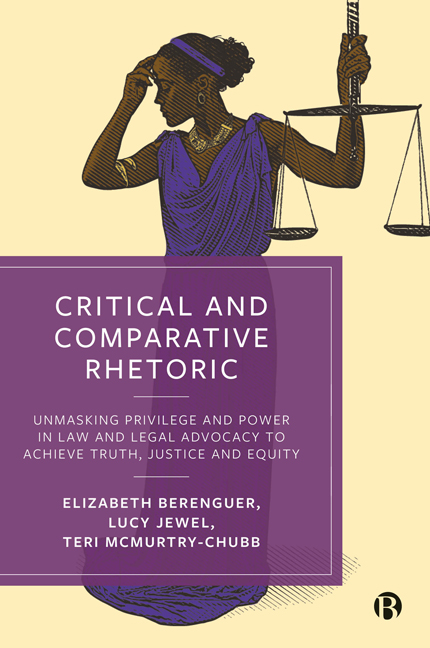 Critical and Comparative Rhetoric
Critical and Comparative Rhetoric Book contents
- Frontmatter
- Contents
- Detailed Contents
- List of Figures and Tables
- About the Authors
- Introduction
- 1 What’s Wrong with Aristotle?
- 2 Problematizing Aristotle: Renovating and Remodeling Traditional Legal Rhetoric
- 3 Shifting the Focus from the West
- 4 Multicultural Rhetorics
- 5 Reproducing the Canon, Reproducing Inequity (Traditional Rhetoric)
- 6 Interrupting the Canon
- 7 Disrupting the Canon: Multicultural Rhetorical Strategies in Action
- References
- Index
1 - What’s Wrong with Aristotle?
Published online by Cambridge University Press: 18 January 2024
- Frontmatter
- Contents
- Detailed Contents
- List of Figures and Tables
- About the Authors
- Introduction
- 1 What’s Wrong with Aristotle?
- 2 Problematizing Aristotle: Renovating and Remodeling Traditional Legal Rhetoric
- 3 Shifting the Focus from the West
- 4 Multicultural Rhetorics
- 5 Reproducing the Canon, Reproducing Inequity (Traditional Rhetoric)
- 6 Interrupting the Canon
- 7 Disrupting the Canon: Multicultural Rhetorical Strategies in Action
- References
- Index
Summary
The power of legal rhetoric
Let's begin with some threshold definitions. What is legal rhetoric? Legal rhetoric is legal language that contributes in some way to the formation of legal meanings or lawmaking. In this view, legal rhetoric includes legal language that is found in primary legal documents such as cases and statutes. It also includes the language that lawyers use when they create legal documents, whether that language appears in advocacy documents like a brief or a motion, or a transactional document like a will or contract. In all of these settings, a lawyer's words have the power to create legal meanings. Helpful here is James Boyd White's expansive view of legal rhetoric as a dynamic “activity of mind and language: a kind of translation, a way of claiming meaning for experience and making that meaning real.” This project builds on this view but adds the critical dimension of exploring the voices and meanings that have been excluded from the process. Historically, not all legal actors have had the power or opportunity to participate in legal meaning making; many have been forcibly excluded from the process.
In both common law and civil law jurisdictions, the ability to create legal meanings carries enormous power. First, legal meanings create the material and social reality for individuals affected by the language. When a lawyer argues that her client is “not guilty,” the jury agrees with the conclusion represented by those words, and the judge then pronounces the client “not guilty,” the client's reality becomes that— they are not guilty. Second, the language is imbued with the power of the state. If a person is pronounced “guilty” of a felony, the power of the state removes their liberty, and they are imprisoned as a result of their guilty status. Or, if a person engages in conduct that a contract's language prohibits, a party can bring the power of the state to bear down on the person, to compel her/him to fulfill the terms of the contract through specific performance or to pay damages for their breach.
- Type
- Chapter
- Information
- Critical and Comparative RhetoricUnmasking Privilege and Power in Law and Legal Advocacy to Achieve Truth, Justice, and Equity, pp. 9 - 35Publisher: Bristol University PressPrint publication year: 2023


